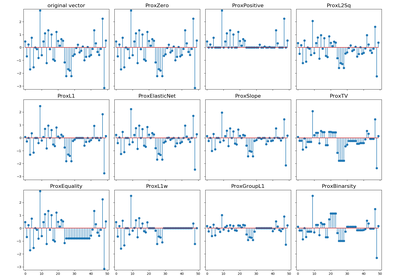tick.prox.ProxEquality¶
-
class
tick.prox.ProxEquality(strength: float = 0, range: tuple = None, positive: bool = False)[source]¶ Projection operator onto the set of vector with all coordinates equal (or in the given range if given one). Namely, this simply replaces all coordinates by their average
- Parameters
strength :
float, default=0.Not used in this prox, but kept for compatibility issues
range :
tupleof twoint, default=`None`Range on which the prox is applied. If
Nonethen the prox is applied on the whole vectorpositive :
bool, default=`False`If True, ensures that the output of the prox has only non-negative entries (in the given range)
- Attributes
dtype :
{'float64', 'float32'}Type of the arrays used.
-
__init__(strength: float = 0, range: tuple = None, positive: bool = False)[source]¶ Initialize self. See help(type(self)) for accurate signature.
-
call(coeffs, step=1.0, out=None)¶ Apply proximal operator on a vector. It computes:
\[argmin_x \big( f(x) + \frac{1}{2} \|x - v\|_2^2 \big)\]- Parameters
coeffs :
numpy.ndarray, shape=(n_coeffs,)Input vector on which is applied the proximal operator
step :
floatornp.array, default=1.The amount of penalization is multiplied by this amount
If
float, the amount of penalization is multiplied by this amountIf
np.array, then each coordinate of coeffs (within the given range), receives an amount of penalization multiplied by t (available only for separable prox)
out :
numpy.ndarray, shape=(n_params,), default=NoneIf not
None, the output is stored in the givenout. Otherwise, a new vector is created.- Returns
output :
numpy.ndarray, shape=(n_coeffs,)Same object as out
Notes
stepmust have the same size ascoeffswhenever range isNone, or a size matching the one given by the range otherwise
